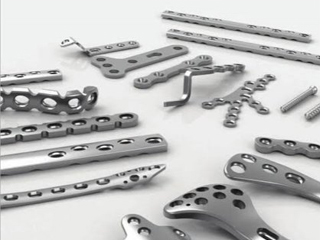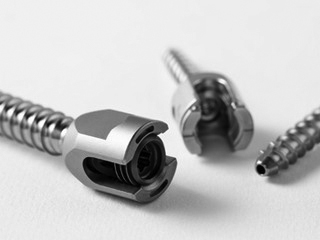Dental implants are mostly made of titanium and work as replacement tooth roots. These implants provide a strong foundation for fixed (permanent) or removable replacement teeth that are made to match the recipient natural teeth. In a few cases, instead of individual crowns, recipients may have attachments on their implant that support a removable denture. Titanium allows dental implants to integrate with bone without being recognized as a foreign object in our body. The global dental implants market size was valued at USD 4.6 billion in 2019 and is expected to grow at a compound annual growth rate (CAGR) of 9.0% from 2020 to 2027.
The Ultimate Guide to Dental Implants
Dental implants have revolutionized the field of restorative dentistry, providing a long-lasting and aesthetically pleasing solution for individuals with missing teeth. Whether you've lost teeth due to injury, decay, or other dental issues, dental implants offer a permanent replacement option that closely resembles your natural teeth. In this article, we will delve into the various aspects of dental implants, including their types, advantages, surgical procedure, success rates, pain levels, and maintenance. Additionally, we will highlight some of the top manufacturers of dental implants worldwide.
What are dental implants?
Dental implants are artificial tooth roots made of biocompatible materials, typically titanium or titanium alloy. They are surgically placed into the jawbone to support prosthetic teeth or dental bridges. Unlike removable dentures, implants fuse with the jawbone, providing a stable foundation for replacement teeth that look, feel, and function like natural teeth.
Types of dental implants
a. Endosteal implants: These are the most common type of dental implants. They consist of small screws, cylinders, or plates that are surgically placed directly into the jawbone. Once the implant fuses with the bone during the healing process, a crown is attached to the implant to complete the restoration.
b. Subperiosteal implants: This type of implant is placed under the gum but above the jawbone. They are suitable for patients with insufficient bone height or density. Subperiosteal implants utilize a metal framework that protrudes through the gums to support the artificial teeth.
What are the advantages of dental implants?
Dental implants offer numerous advantages compared to other tooth replacement options. Some key benefits include:
a. Improved aesthetics: Implants closely resemble natural teeth in appearance, providing a seamless and natural-looking smile.
b. Enhanced functionality: Implants restore full chewing power, allowing you to enjoy a varied diet without limitations.
c. Long-lasting solution: With proper care, dental implants can last a lifetime, making them a durable and cost-effective option in the long run.
d. Preserves bone health: Implants stimulate the jawbone, preventing bone loss and maintaining facial structure.
e. Improved speech: Unlike removable dentures, implants eliminate the risk of slurred speech or denture movement.
Dental implant surgery and procedure
Dental implant surgery is typically performed in several stages:
a. Initial consultation: The dentist evaluates your oral health, takes X-rays, and determines if you are a suitable candidate for dental implants. A treatment plan is then created.
b. Implant placement: In this surgical procedure, the dentist makes an incision in the gum to expose the jawbone. A hole is drilled into the bone, and the implant is carefully placed. The gum is sutured, and the healing process begins.
c. Osseointegration: Over the next few months, the implant fuses with the jawbone through a process called osseointegration. This creates a strong and stable foundation for the artificial tooth.
d. Abutment placement: Once osseointegration is complete, a small connector called an abutment is attached to the implant. The abutment serves as a support structure for the final restoration.
e. Restoration placement: Finally, a custom-made crown, bridge, or denture is attached to the abutment, completing the dental implant process.
How successful are dental implants?
Dental implants have a high success rate, with studies reporting success rates of over 95% in properly selected cases. Success depends on factors such as the patient's overall health, oral hygiene, and the experience of the dental professional performing the procedure. Regular dental check-ups and proper oral hygiene practices are crucial to maintaining the longevity of dental implants.
How painful are dental implants?
Most patients report minimal discomfort during the dental implant procedure. Local anesthesia is used to numb the area, ensuring a painless experience. After the surgery, some swelling, bruising, or mild discomfort may occur, but these symptoms can be managed with over-the-counter pain medications and ice packs. The level of discomfort varies from person to person, but it typically subsides within a few days.
How do I care for dental implants?
Proper care is essential to ensure the longevity of dental implants. Here are some key guidelines for implant maintenance:
a. Brush and floss regularly: Maintain good oral hygiene by brushing your teeth twice a day and flossing daily. Use a soft-bristle toothbrush and non-abrasive toothpaste to avoid damaging the restoration.
b. Attend regular dental check-ups: Visit your dentist for routine check-ups and professional cleanings to detect any potential issues and ensure the health of your dental implants.
c. Avoid harmful habits: Avoid smoking, as it can impair the healing process and increase the risk of implant failure. Additionally, refrain from chewing on hard objects, such as ice or pens, to prevent damage to the restoration.
d. Optimal nutrition: Follow a well-balanced diet to support overall oral health and promote healing after the implant procedure.
Top manufacturers of Dental Implants in the world
Several manufacturers specialize in producing high-quality dental implants. Here are some of the top manufacturers known for their expertise and innovation in the field:
a. Nobel Biocare: Nobel Biocare, a subsidiary of Danaher Corporation, is a leading manufacturer of dental implants, providing a wide range of innovative implant systems and restorative components.
b. Straumann: Straumann is a Swiss-based company renowned for its comprehensive range of dental implants, including tissue-level and bone-level implant systems.
c. Zimmer Biomet: Zimmer Biomet offers a diverse portfolio of dental implant solutions, focusing on advanced technologies and personalized treatment options.
d. Dentsply Sirona: Dentsply Sirona provides a broad spectrum of dental implant systems, utilizing cutting-edge technologies and materials to ensure successful outcomes.
Dental implants have revolutionized the field of restorative dentistry, offering a long-lasting and natural-looking solution for individuals with missing teeth. They provide numerous advantages, including improved aesthetics, enhanced functionality, and preservation of bone health. The dental implant procedure is generally well-tolerated, with minimal pain and discomfort. By following proper oral hygiene practices and regularly visiting your dentist, you can ensure the success and longevity of your dental implants. Remember, selecting a reputable dental implant manufacturer is crucial, and companies like Nobel Biocare, Straumann, Zimmer Biomet, and Dentsply Sirona have established themselves as leaders in the industry, providing high-quality implant systems and components.













